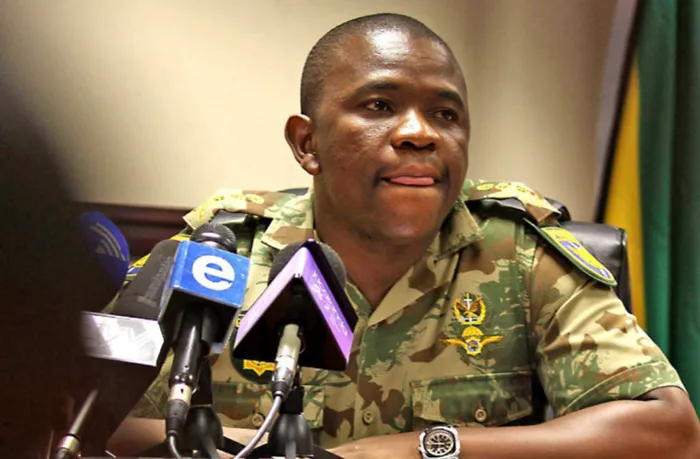
Acting Police Minister Firoz Cachalia testifies at the parliamentary inquiry probing allegations made by KZN provincial commissioner Nhlanhla Mkhwanazi (pictured).
Image: Thobile Mathonsi / Independent Newspapers
Acting Police Minister Firoz Cachalia on Wednesday said the press conference by KwaZulu-Natal commissioner Nhlanhla Mkhwanazi on July 6 was unusual and had him worried.
“His appearance before the public in full military regalia, armed and so forth worried me and I made a statement to that effect after my appointment.
“I said at the time, which I maintain is correct, that kind of public statement was not in the ordinary situation in the expected situation, appropriate because police have command structures. There is a national commissioner and there is a minister and a president,” Cachalia said.
He was giving testimony to the parliamentary inquiry that is probing the allegations that were made by Mkhwanazi at the press conference.
Mkhwanazi’s explosive press conference led to the suspension of then Police Minister Senzo Mchunu and subsequently to Cachalia’s appointment on August 1.
It also led to the establishment of the parliamentary inquiry and the Madlanga Commission of Inquiry.
Cachalia said he has learnt that Mkhwanazi had appeared before the Police Portfolio Committee on March 5 where he shared his views publicly for the first time.
He also said while he was at Wits University (his previous employer), he did not pay attention to specific issues before Parliament.
“I was unaware that he had made some of those statements previously.”
However, Cachalia said ordinary professional conduct required respect for structures of authority.
“He made worrying allegations about infiltration of criminal cartels into the police service and the political process. If those allegations were to be sustained, he would have been vindicated. In that sense he would have been shown to be a whistle-blower,” he said.
“When senior officials, who are ordinarily expected to adhere to those principles, where an extreme situation arises, such as we are now in, and those norms are not working to achieve the results society expects, - one expects bold, courageous conduct by those who hold important positions in our society to tell the truth whatever the consequence might be visited on them personally,” Cachalia added.
He also said that he had been listening to parts of Mkhwanazi’s testimony at the Madlanga Commission of Inquiry and the parliamentary inquiry.
He also said that he had been listening to parts of Mkhwanazi’s testimony at the Madlanga Commission of Inquiry and the parliamentary inquiry.
“His testimony and of others, particularly before the Madlanga Commission, those three witnesses that testified in camera, are very alarming, very concerning, but, of course, neither yourselves nor the Madlanga Commission has come to a conclusion.
“For the time being my own posture is that despite the concerns that I had and the public has about evidence that is already in the public domain, my own posture is I will wait for this inquiry and the Madlanga Commission to come to a conclusion," Cachalia said, adding that he will wait for the process to conclude to understand 'what really happened over the last few years in the SAPS and more generally'.
Chief evidence leader Advocate Norman Arendse, SC, asked whether Cachalia has subsequently met with Mkhwanazi and senior management in SAPS to share and express his concerns.
Cachalia said he had discussed the matter of the Political Killings Task Team (PKTT) with national commissioner Fannie Masemola in two meetings and Mkhwanazi was present in one of those meetings.
“That meeting followed a meeting I had with senior management, all provincial commissioners and divisional commissioners.
“After that meeting, the provincial commissioner (Mkhwanazi) was present in that meeting and the national commissioner and I took the opportunity to have a brief meeting. General Mkhwanazi was invited into the meeting and we did discuss the matter of the PKTT and what happened to the dockets, but briefly.”
Cachalia explained that he had been trying to understand what exactly happened with the PKTT, the reasoning that informed Mchunu’s decision to disband the team, Masemola’s relationship with Mchunu and whether the team had been disbanded, and if so, what happened with the dockets.
“I was concerned that it was in the public domain that the task team had been disbanded. I was not sure what happened to the dockets.”
mayibongwe.maqhina@inl.co.za